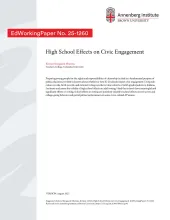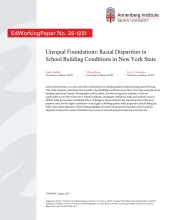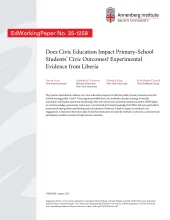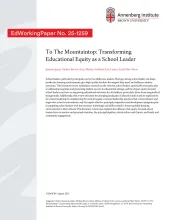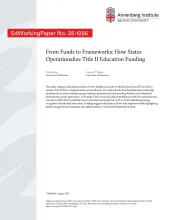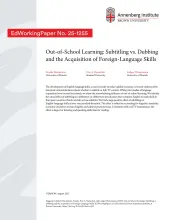Follow the User Guide to start building your site.
Follow the User Guide to start building your site.
NEW EdWorkingPapers
High School Effects on Civic Engagement
Preparing young people for the rights and responsibilities of citizenship is cited as a fundamental purpose of public education, yet little is known about whether or how K-12 schools impact civic engagement. Using edu- cation records, birth records, and national voting records for nine cohorts of ninth grade students in Indiana, I estimate and assess the validity of high school effects on… more →
Unequal Foundations: Racial Disparities in School Building Conditions in New York State
School infrastructure is a critical yet often overlooked factor shaping student health, learning, and well-being. This study examines racial disparities in public school building conditions across New York State using data from building inspections linked to demographic and fiscal data. Schools serving more students of color are significantly more likely to have poor overall conditions,… more →
Does Civic Education Impact Primary-School Students’ Civic Outcomes? Experimental Evidence from Liberia
We present experimental evidence on a civic education program in Liberia's public primary schools across 140 schools serving grades 3 and 4. The program provided new civic textbooks, teacher training, bi-weekly instruction, and regular classroom monitoring. After one school year, treatment students scored 0.31SDs higher on civic knowledge assessments. Gains were concentrated in factual… more →
To The Mountaintop: Transforming Educational Equity as a School Leader
School leaders, particularly principals, can be true difference makers. Having a strong school leader can shape productive learning environments, give high-quality teachers the support they need, and influence student outcomes. This literature review synthesizes research on the role that school leaders, specifically principals, play in addressing inequities and promoting student success in… more →
From Funds to Frameworks: How States Operationalize Title II Education Funding
This study employs a document analysis of Every Student Succeeds Act (ESSA) plans from 2017 to 2022 to examine Title II, Part A, implementation across all states. We analyzed state-level fund allocation, leadership development activities, and discrepancies between planned and actual spending. Results reveal substantial heterogeneity in state approaches: 23.5% made Title II-A-specific plan… more →
Out-of-School Learning: Subtitling vs. Dubbing and the Acquisition of Foreign-Language Skills
The development of English-language skills, a near necessity in today’s global economy, is heavily influenced by historical national decisions about whether to subtitle or dub TV content. While prior studies of language acquisition have focused on schools, we show the overwhelming influence of out-of-school learning. We identify the causal effect of subtitling in a difference-in-differences… more →
